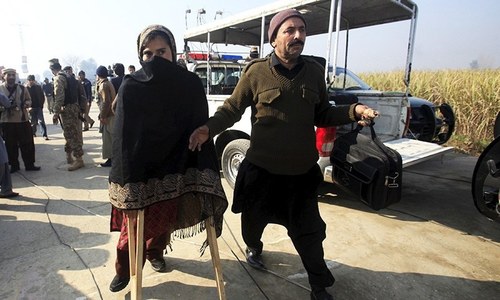ISLAMABAD: The legislative business of the National Assembly took a back seat to the terrible tragedy that occurred in Charsadda on Wednesday, with lawmakers clamouring for a chance to talk about the brazen attack on Bacha Khan University as it unfolded.
However, it was also a day for soul searching, with two senior parliamentarians recalling that this wave of terrorism sweeping the country was partially of “our own making”.
In reaction to the attack in Charsadda, both PkMAP chief Mehmood Khan Achakzai and Defence Minister Khawaja Asif agreed that training and harbouring “some of the most dangerous people from around the world” had come back to haunt Pakistan.
“When the USSR invaded Afghanistan, Pakistan taught some of the most dangerous people in the world how to fire Stingers and then turned them loose. But we never bothered to maintain a register,” Mr Achakzai said, adding that after the USSR pullout from Afghanistan, Pakistan continued to interfere in its neighbour’s affairs.
“Musharraf admitted that we trained militias and armed them. They were once our heroes but now they are villains,” he said.
He said that unless Afghanistan announced that they would not harbour terrorists (working) against Pakistan, and Pakistan made a similar commitment, the whole region would remain in peril.
This view was seconded by the defence minister, who said that the people who were trained in Pakistan had become “harbingers of death” in the world.
“The fires that were lit in the 1980s are now engulfing us,” he said, adding, “terrorism is terrorism, everything else is brand names”. New names, he said, were adopted to scare and terrify, since terrorism was a state of mind.
The day had begun with question hour, where Speaker Ayaz Sadiq grew impatient with government officials who were absent. Since attendance on the treasury benches was thin first thing in the morning, Parliamentary Affairs Minister Sheikh Aftab Ahmed had to bear the speaker’s wrath over unanswered questions and absent officials. Leader of the Opposition in the National Assembly Syed Khursheed Shah then brought up the attack, saying that it should have been discussed before regular business was taken up.
The speaker, who wanted legislative business to proceed, allowed the information minister to share some updates, before saying that the house could take up the matter once more information about the attack was available.
Shahji Gul Afridi, a Fata MNA, then led a prayer for the victims of the terrorist attacks in Jamrud, Charsadda and Balochistan.
Taking the floor again, Khursheed Shah asked for the session to be deferred until the next day, offering the government a commitment that the opposition would not point out quorum even if there was thin attendance.
His point of view was endorsed by Safron Minister Abdul Qadir Baloch who said that other activities should be shelved in favour of debate on the Charsadda attack. However, his party colleague Rana Tanveer Hussain pointed out that the business of the house was sacred and should continue even in wartime.
MQM and JI lawmakers also joined calls for the suspension of regular business, which prompted the speaker to suspend the session for an hour.
When the sitting resumed, lawmakers from both sides of the aisle were given ample time to get their point across. Information Minister Pervaiz Rashid, presenting a report on the day’s events, told the house that terrorists had entered Bacha Khan University under the cover of heavy fog.
State Minister for Interior Baleeghur Rehman told the house that a Nadra team had been dispatched to Charsadda to help identify the terrorists.
PTI’s Shah Mehmood Qureshi said he had spoken to his party leader Imran Khan and KP CM Pervez Khattak, and shared the information he had. He also praised the valour of the guards who engaged the terrorists first, which allowed the rest of the university enough time to take evasive action and shift students to safer locations.
He also pointed out that soft targets such as Bacha Khan University would always be susceptible to such attacks, no matter how much security was deployed.
JI’s Sahibzada Tariqullah, in an impassioned outburst, said that lawmakers could not continue deliberating on house business because “our hearts and minds are in Charsadda”.
Referring to maltreatment of Pashtuns, he asked the government, “Everywhere we go, we are harassed; by police, by the army and asked to show our ID cards. Do you want us to migrate? Shall we head to China or go jump in the ocean?”
“We can’t speak openly about many things. If we do, we will be no more once we leave this house,” he said, without elaborating.
Sheikh Rashid Ahmed then took the floor and seemed to point the finger at India — a cue many others took from him — without naming it. “Who destroyed our Awacs? Who attacked APS,” he asked in a pointed manner.
“The tussle between [different countries’] agencies has reached alarming heights,” he said, claiming that the hit on Khalid Bashir — the Jamaatud Dawa security chief who was found dead under mysterious circumstances in 2013 — had been ordered from Dubai.
Published in Dawn, January 21st, 2016

















































